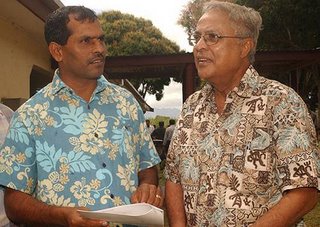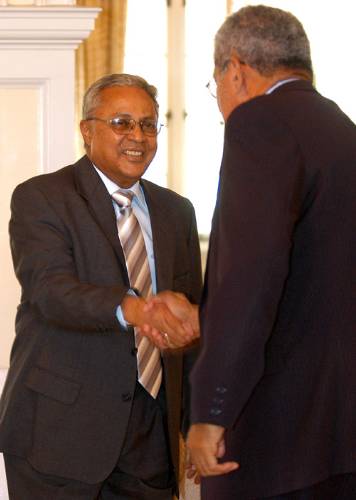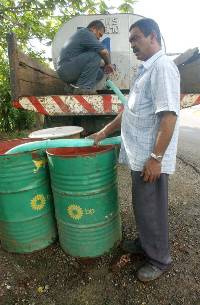 Fijian Holdings Building, Suva.
Fijian Holdings Building, Suva.This building owned by Fijian Holdings, remind the average Sitiveni and Salas' of the cognitive dissonance in native affairs. Case in point, the number of Fijian drop outs in schools.
Did Fijian Holdings and investment arm of the 14 provinces, offer to partially fund education?
Clearly there is a track record of nepotism in the commercial operations of this company, that uses and abuses the plight of the Fijian race; for their own agenda. This is the apex of the flawed Affirmative Action(A.A) program that was deemed unconstitutional by Human Rights group in Fiji.
In a wicked twist fit for a Hollywood thriller, Fijian Holdings was the same company whose board room was used for the planning of the 2000 coup. One is led to wonder what other resources of Fijian Holdings was used. A company which is finanicially successful enough to provide funding. Along with being a major player in tourism developments (among others) in Fiji, that could have been affected by an incoming Government.
Here is another Fiji Sun article quoting the formerly convicted(for the events of post-coup 2000) Minister and chief Ratu Naiqama Lalabalavu, on the A.A program.
Affirmative action for all, chief pledges
Affirmative action is not confined to one racial group, the Minister for Fijian Affairs, Lands and Provincial Development, Ratu Naiqama Lalabalavu, pledged yesterday. He was on a visit to government projects in Ba aimed at assisting the disadvantaged. Ratu Naiqama said the government team was able to mingle with a lot of people benefiting from these projects.
These included the rural housing scheme and other infrastructure developments in villages throughout the Western Division. Accompanied by the Minister of State for Provincial Development, Ted Young, and Minster of State for Fijian Affairs, Ratu Suliano Matanitobua, Ratu Naiqama said the visit was to follow up on developments in the Western Division.
"We have completed visits to parts of Nadi, Lautoka and Ba where a number of government-funded projects have been staged to help a lot of those people who are faced with difficulties in trying to make ends meet," he said. "We're looking at depressed areas also and we met a number of cases that involved a family whose house burnt down three years ago but have managed to rebuild their lives."
The projects are part of the Affirmative Action Programme to help the disadvantaged. Ratu Naiqama said one thing the ministry would like to highlight was the need for everyone to work together in making the projects work for all. "This programme is not just to help one particular race as claimed by people who are saying it is biased," he said.
The reoccuring protests by frustrated landowners in Fiji, undermines the integrity of Native Land Trust Board. Land is a volatile issue in Fiji and for the last forty plus years under the administration of this proxy entity, nothing prospective and progressive has ever materialized. Simply because the very landowners have been connivingly sidelined from the negotiating table.
The matter of centralized decision making in Fiji has been ingrained from the colonial experience under the British. This method of governance in Fiji is well past any viable shelf life. Furthermore, it is apparent that some circles in Fiji Public Service believe that there are no alternatives. Realistically, these relics of public administration fear change more than anything else. Chaining the entire nation to their historical vices, that are absent of innovative virtues.
A variation of this centralized decision making, is demonstrated by the new task force to evaluate the future of Fiji's public water supply. Most of the appointees are a motley crew, equi-sourced from Government and private sectors. Native landowners, Consumer watch dogs, Non-Governmental Organization and Human Rights Groups need not apply.
FijiSun Editorial-Thursday 13th July, 2006
No water sell-off
Water is not a luxury. It is a necessity for human survival and has been quite rightly described as a basic human right. Access to clean, plentiful and potable water should be the right of every man, woman and child in these islands. Unfortunately, however, water has become a political liability for the present and previous governments. This is because they have been unable to deliver an acceptable service due to the lack of vision of their predecessors who failed utterly to invest in the future. As a result Fiji is stuck with ageing infrastructure and equipment that frequently fails with the resultant wait for the water truck that has become so familiar to so many of Fiji's citizens. Little wonder, then, that the Government is keen to pass the problem to the private sector.
But great care will need to be taken and, it must be said, the early indicators are not encouraging. The absence of any form of consumer representation in the study group examining the possibility of privatisation is of particular concern.
The businessmen and government officers examining this concept are eminent people - but business people are perceived rightly or wrongly as representing business interests. In a debate on such a vital service they will not been seen as consumer advocates. Indeed, the Government would do well to balance their input with advice and experience from consumer groups and relevant non-government organisations.
The fear, of course, is that privatisation (which is by no means inevitable) will result in a plentiful supply of good clean water for those who can afford it and a second rate service for those who cannot. The Government has already pledged its solemn word that this will not be permitted to happen - but once the supply of water is out of its hands it will become ever more difficult for it to keep that promise. In fact privatised water has the potential to become even more of a political headache than the present service, however poor that may be. On the other hand consumers need to accept that if they want a reliable service they will have to fund it.
On balance, then, water like education and health is a vital service that should continue to be controlled and delivered by the state. In that way donor - and private sector - assistance may well be available and should be welcomed. For there is no doubt whatsoever that only a major overhaul requiring equally major investment is the only means of providing the people of Fiji with the service they have a right to expect. But water must remain a public service.
 View of the corner: Dennison Road(diagonal) and Pender Street, Domain, Suva.
View of the corner: Dennison Road(diagonal) and Pender Street, Domain, Suva.Club Em Designs


























